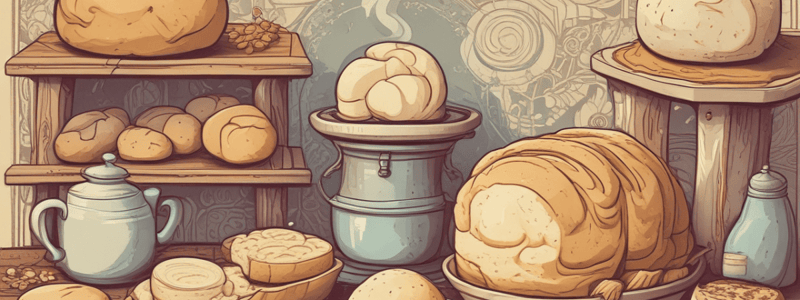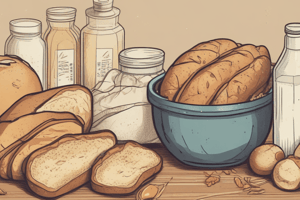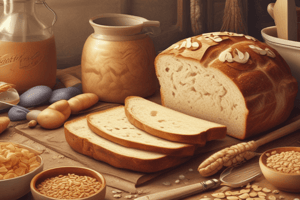Podcast
Questions and Answers
What is the primary reason for controlling the final dough temperature in breadmaking?
What is the primary reason for controlling the final dough temperature in breadmaking?
- To ensure consistency in product quality (correct)
- To speed up the fermentation process
- To increase the yeast's activity
- To change the physical properties of the dough
Which of the following is NOT affected by changes in temperature in breadmaking?
Which of the following is NOT affected by changes in temperature in breadmaking?
- Yeast activity
- The color of the dough (correct)
- Chemical reactions
- Enzymic activity
What is the result of lower temperatures in breadmaking?
What is the result of lower temperatures in breadmaking?
- Decreased enzyme activity and slower fermentation
- Increased yeast activity and faster fermentation
- Decreased oxidation and lower bread volume (correct)
- Increased oxidation and higher bread volume
What happens to the rheology of the dough when the temperature is increased?
What happens to the rheology of the dough when the temperature is increased?
Why is it necessary to control the dough temperature during bulk fermentation?
Why is it necessary to control the dough temperature during bulk fermentation?
What is the effect of higher temperatures on moulder damage?
What is the effect of higher temperatures on moulder damage?
What is the result of very high dough temperatures?
What is the result of very high dough temperatures?
Why is it impossible to compensate for variations in dough temperature, even with a well-controlled prover environment?
Why is it impossible to compensate for variations in dough temperature, even with a well-controlled prover environment?
Study Notes
Importance of Dough Temperature Control
- Controlling final dough temperature is crucial for product quality consistency, regardless of the breadmaking process used.
- Almost all chemical and biochemical processes in breadmaking are temperature-sensitive.
Enzymic Actions and Temperature
- Enzymic activity increases with rising temperature, but maximum activity temperature varies depending on the enzyme.
- Complex series of enzymic actions occur in fermenting dough, and all are temperature-sensitive.
Temperature Effects on Dough Properties
- Lower temperatures result in less oxidation, leading to dough with reduced ability to retain gas and lower bread volume.
- Variations in dough temperature affect dough rheology, making it more or less viscous and easier or harder to deform.
- Temperature affects mechanical moulding, with higher temperatures resulting in less moulder damage.
Temperature Sensitivity in Breadmaking
- Gas production by yeast is temperature-sensitive, influencing dough volume at the end of proof.
- Even in a well-controlled prover environment, variations in dough temperature cannot be compensated for.
- Variations in proof volume cannot be fixed by changing proof time, leading to variations in bread volume and quality.
Optimal Dough Temperature Choice
- The ideal dough temperature depends on the breadmaking process used.
- Higher dough temperatures are used with no-time doughs than those with bulk fermentation or significant processing times.
Critical Control Point
- Temperature control is the single most critical control point in the bakery.
Studying That Suits You
Use AI to generate personalized quizzes and flashcards to suit your learning preferences.
Description
Learn about the importance of controlling dough temperature in breadmaking and its impact on enzymic actions and product quality consistency.




